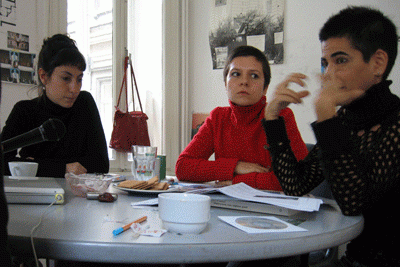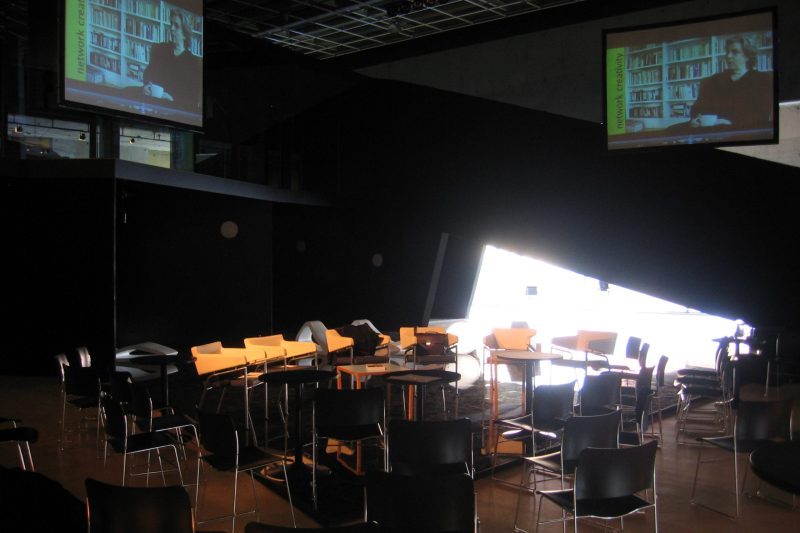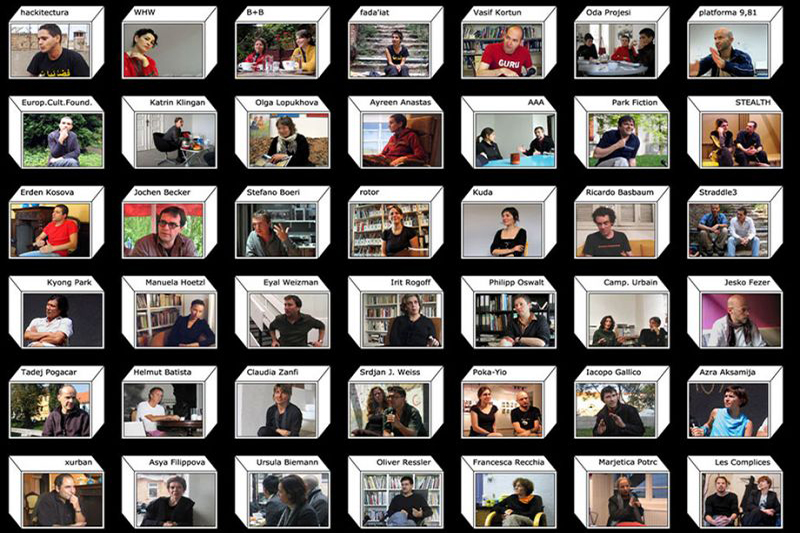- Interview
- Novi Sad
- 06.08.2006
- NETWORKED CULTURES
conversation with Kyong Park
PM/HM: You were one of the initiators of the Lost Highway Expedition, an experimental gathering that brought together a multitude of individuals, groups and institutions along the unfinished “Highway of Brotherhood and Unity” in former Yugoslavia. What were the reasons for instigating this self-organised collective journey through the Western Balkans?
Kyong Park: At the very end of 2004, Marjetica Potrc and I took a twelve-city tour in four weeks, a prelude to the Lost Highway Expedition (LHE). During the tour, we presented our works and met many of the people we ended up working with later during LHE. On the trip, we became aware of the emergence of new networks that were beginning to link the now separate republics and autonomous regions of the so-called Western Balkans. We sensed the energy and desire to move on from the horrific events of the 1990s, and form a better future with new ideas and initiatives. All this inspired us to think up a project that might extend these emergent links. And perhaps by travelling through these cities in one continuous link, we would be able to open a new “passage”, one that would be different – in nature if not in scale – to Tito’s incomplete “Highway of Brotherhood and Unity” and the EU’s proposed “Corridor X”.
This was also the starting point for Europe Lost and Found (ELF), which involved inquiring into what kinds of links and networks were being formed in the transitional states of post-YU and pre-EU, and whether such temporal and temporary webs would be able to reconcile two historically confrontational territorial frameworks, i.e., communism and capitalism or democracy and autocracy. Yes, this is a heavy subject to tackle, though it doesn’t have to be if we take a more informal and bottom-up position, which anyway fits the region better. Moreover, the incompleteness of the utopias of previous regimes was perhaps not due to the ill conception of their original ideas, but rather to the finality of the reality resulting from their bad practices. Fittingly, LHE – the first stage of ELF and our first expedition – created a situation where more people could engage in what I call “nomadic practices”. And it is important to say that these differ from contemporary practices of networked culture, which are largely conceived through digital cultures. In contrast, “nomadic practices” reinvest in the importance of real space and time by making a physical expedition the primary instrument of cultural, economic and political exploration, where knowledge and information originate from real experiences.
Furthermore, an expedition – with its notion of traversing unknown territory – sufficed, as was our intention, to avoid various external preconceptions about the region, especially the widely popular assumption that the countries of the Western Balkans were an exotic and primal version of civilized Western Europe. And by not constructing an all-encompassing concept or definitive strategy, LHE left the participants room to contribute to the programme while we were moving through the cities. This also reduced any hierarchical and centralised tendencies of the participants who came from outside the region, especially as most of the region had once been subject to the Habsburg and Ottoman empires, and was now affected by the economic superiority of the EU. Instead, we merely constructed a platform for new cultural practices, one that would be able to function as a fragmented peripheral system within the landscape of balkanisation. The idea was to create common intellectual and experiential spaces where outsiders and insiders would be able to operate on equal and mutual levels of exchange. At the same time, this undefined platform levelled things between project initiators and participants. Hence, LHE is a post-ideological and non-centralized system, structured to accommodate the essence of networked culture, i.e., individual innovations within a shared intellectual world.
PM/HM: How do you see experimental collective investigations such as the Lost Highway Expedition in relation to the current geopolitical urgencies? Does this form of collective action promote a performative politics of cultural engagement?
Kyong Park: For me, the most interesting aspect is the relationship between the individual and the collective. And I use the word collective rather than collaboration not because the Lost Highway Expedition was staged in the territory of a past collective, but because our generation exists in a period engaged in making future collectives. The difference here is that the collective in the past was a top-down social utopia, whereas today we are seeing the emergence of bottom-up social practices. The latter assumes the existence of individual freedom without any centralised belief with its governing infrastructures, and underscores the importance of the individual. The most useful definition of globalisation depicts it as a process that brings the two social trajectories, that I mentioned earlier, into a confrontational state that can be negotiated in space; i.e., in cities, regions, continents and beyond.
The fact that no clear definition of globalisation exists suggests that it is not an entity, but rather a temporary process related to the historical transition from a centralised top-down social system to a fragmented bottom-up social system. In this sense, the balkanization of the Western Balkans and its re-emergence via bottom-up locality is an important opportunity for the transitional process called globalization. And the slowness with which the Western Balkans are being absorbed into the EU – besides the obvious economic differences – may be related to the cultural political gap between the highly balkanised territories and the centralising, if not standardising, ambitions of the EU. Furthermore, in a period when the balkanised system is being assimilated into a more generalised system, the former may be gaining relevance over the latter in the EU. This means, for example, that by the time Serbia becomes eligible to join the EU, the EU may not exist anymore. Other areas where balkanisation may be more practical than assimilation include Iraq, the Kurdish territories, Palestine and Kashmir. On a global scale, it has to do with the “Functioning Core”, i.e. the Northern Hemisphere, and the “Non-Integrating Gap”, i.e. the Southern Hemisphere, as defined by Thomas Barnett in his book The Pentagon’s New Map.
Within the global and urban politics of exclusion and inclusion, LHE – with its “nomadic practices” – is about cutting a bottom-up path through top-down territorialisation. The informal process and miniscule scale of LHE reflects the nature of the fragmented collectivism of balkanisation, which is now also being called “globalisation from below”. The value of disenfranchised cultural projects like LHE should not be judged by the scale of their actions but by their growing merit in relation to their context.
PM/HM: There is a similar trajectory of experimenting with institutional structures in the case of the International Centre for Urban Ecology (iCUE), a nomadic laboratory for future cities, which you founded in 1998. Which directions do you see emerging through such experimental institutions and what can we expect from them in the future?
Kyong Park: If I may take my own practical experiences as a reference, the first possibility is for cultural institutions to become nomadic, both in location and subject. Probably only through such flexibility will they be able to act both globally and locally, and not be contaminated by unilateral devices of cultural imperialism. Outsourcing and multi-nationalising of cultural projects and institutions are already underway, as can be seen in how the German Federal Cultural Foundation has implemented projects like relations and Migration. Though I see these processes as a kind of return to Said’s Orientalism, because this foundation is a top-down state fund, no matter how independent and experimental it might be and, indeed, is.
The second possibility is for cultural institutions to be more renegade and go beyond “alternative” or “underground” frameworks. The closest anyone has ever come to achieving this radicalisation of cultural institutions is probably to be found in the culture of “freedom fighters”, for their images and spiritual states oscillate between aesthetics and religious ideas, in a kind of repetition of art history. Of course such a radicalisation is incredibly difficult for cultural projects and institutions to achieve or even desire. Yet as the global village becomes more political – and this is inevitable – it may not be too far fetched to expect cultural institutions to go renegade. And this would give cultural projects and institutions even more reason to be as nomadic as freedom fighters.

Kyong Park
is acting associate professor of public culture at the Department of Visual Arts at the University of California, San Diego, USA. He was the founding director of the Centrala Foundation for Future Cities in Rotterdam (2005), a co-curator of Europe Lost and Found and a founding member of Lost Highway Expedition (2006). He served as editor of Urban Ecology: Detroit and Beyond (2005), a co-curator for Shrinking Cities in Berlin (2002 to 2004), the founding director of the International Centre for Urban Ecology in Detroit (1999 to 2001), a curator of the Kwangju Biennale in South Korea (1997), and the founder/director of Storefront for Art and Architecture in New York (1982 to 1998). Working as an artist, architect, curator and theorist, using texts, photographs, videos, installations and multi-media, he has produced research reports, documents and representations of urban landscapes that delineate economic, political and cultural borders and that chart out the territories of contemporary social geography.


